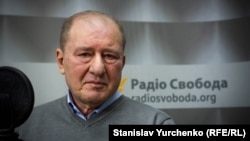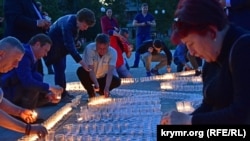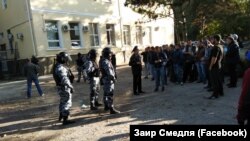On January 13, Russia’s TASS state news agency reported that “Crimean Tatars declared their support for Vladimir Putin in the Russian Federation’s presidential election.” TASS quoted Seitumer Nimetullayev, identifying him as the head of a body called the “Public Council of the Crimean Tatar People”:
"We waited for more than 70 years for the rehabilitation of the Crimean Tatar people, which they saw come true thanks to our president (in spring 2015, the Russian president signed a decree on measures to rehabilitate the Armenian, Bulgarian, Greek, Crimean-Tatar and German peoples-TASS)," Nimetullayev said.
"For more than 20 years (when Crimea was part of Ukraine-TASS) we asked that the Crimean Tatar language be a state language in Crimea, and only saw this come true after the reunification of the peninsula with Russia."
According to the Ukrainian journalist anti-propaganda fact checking Web site StopFake.org, Nimetullayev, formerly a businessman with property in Kherson on the Ukrainian mainland, has not been recognized as a Crimean Tatar leader outside the Russian Federation. He moved to Crimea after Russia annexed the peninsula in 2014 and set up his organization there. Prior to that, Stopfake.org reports he enjoyed “vast landholdings, vacation resorts and automobile businesses.” Since then, Ukrainian authorities have initiated three criminal cases against him and issued a warrant for his arrest.
The organization of Crimean Tatars recognized and legalized by the Ukrainian president in 1999 is known as the Crimean Tatar Mejlis (council), which was formed in 1991. The Russian authorities declared this organization “extremist” in 2016 and banned it from the occupied peninsula. Several members of the organization have been imprisoned or charged with various offenses by Russian authorities. In the group’s complicated history, the Mejlis “had a stormy and uneven relationship” with the Ukrainian government, according to RFE, and was recognized by the Verkhovna Rada, the Ukrainian parliament, after the Crimean annexation. Relations between the Mejlis and ethnic Russians in Crimea have been “fraught.”
As for Nimetullayev falsely claiming that the Crimean Tatars had to wait for Russia’s annexation of the peninsula to be officially rehabilitated: After Soviet forces reconquered the Crimean peninsula in the spring of 1944, the Crimean Tatars, along with other minorities like Bulgarians and Greeks, were deported en masse from the peninsula, for their alleged mass collaboration with the German occupiers. In the late 1980s, after decades of efforts by Crimean Tatar activists, Soviet leader Mikhail Gorbachev opened a commission to investigate the deportations. In 1989, the Supreme Council of the Crimea rescinded the ban on Crimean Tatars returning to the peninsula and declared that the deportation in 1944 had been a criminal act. In April 1991, the Russian Soviet Federated Socialist Republic (which would later become the Russian Federation after the breakup of the USSR), passed the law “On the Rehabilitation of Repressed Peoples,” which covered victims of “forced resettlement." The Russian Federation government adopted an updated version of this law in 1993.
In short, before Putin’s 2015 decree, the Crimean Tatars had already been rehabilitated three times -- once by the Soviet government, once by the Russian Soviet Federated Socialist Republic, and once by the Russian Federation. Nimetullayev’s claim that the Crimean Tatar language achieved official status only after Russia’s annexation is also false. The constitution of Ukraine’s Autonomous Republic of Crimea grants the Crimean Tatar language official status.
Since Russia’s annexation of Crimea in March 2014, a human rights watchdog chronicles Russian treatment of the peninsula’s Crimean Tatar residents.
"Russian authorities and their proxies have subjected members of the Crimean Tatar community and their supporters, including journalists, bloggers, activists, and others to harassment, intimidation, threats, intrusive and unlawful searches of their homes, physical attacks, and enforced disappearances," Human Rights Watch reported in November 2017.
In addition to banning the Crimean Tatar Mejlis, Russian authorities also closed the only Crimean Tatar TV network, ATR, in 2015. The network reopened in government-controlled Ukraine. And while Nimetullayev praised Putin for his 2015 decree on rehabilitation of the Crimean Tatar people, local authorities in the Crimea banned memorial events dedicated to the mass deportations of 1944.



